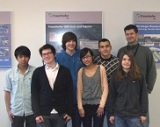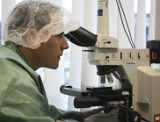Work experience at Fraunhofer IZM a hit with high school students


January 2011
Six eleventh and twelfth grade students from the Heinrich-Hertz-Gymnasium in Berlin-Friedrichshain completed a three-day work experience program at Fraunhofer IZM in January 2011. The high school recently joined Fraunhofer IZM's growing number of partner schools. Each pair of students took on an experiment from one of the following topics:
Wire bonding technologies
In the wire bonding laboratory, the students learnt how a silicon chip is electrically connected to the surrounding circuit board and, supervised by two microtechnologists, tested the reliability of a wire bond using a pull tester. How stable is the soldering of tiny SMD components? To find out, the students carried out shear tests in the laboratory.
Chemical laboratory / substrate technology
In the chemical laboratory, the students measured the layer thicknesses of electroplated circuit boards, and optically measured electroplated traces and pads. The students also managed to calibrate the X-ray fluorescence (XRF) machine using a bath analysis for circuit board manufacture.
Long-term condition monitoring of electronic components
The state of electronic components in machines under various environmental influences such as vibration and humidity is controlled and analyzed in Fraunhofer IZM's Electronic Condition Monitoring laboratory. Here the students performed vibration measurements on electronic components in shakers and, using acceleration testing, investigated how often a device can fall before the electronics fail. This was particularly interesting for the teenagers majoring in math, as the tests involve integral and differential calculus.
On the final day, all three groups presented short talks on the technical parameters of their measurement experiments and their results. The Fraunhofer IZM supervisors were extremely impressed at how deeply the students had gone into the material, how well they had understood details, and the extent to which they had digested the content in just three days.
The students’ feedback was also extremely positive - their only complaint was that three days was simply not long enough.
Last modified:
 Fraunhofer Institute for Reliability and Microintegration IZM
Fraunhofer Institute for Reliability and Microintegration IZM